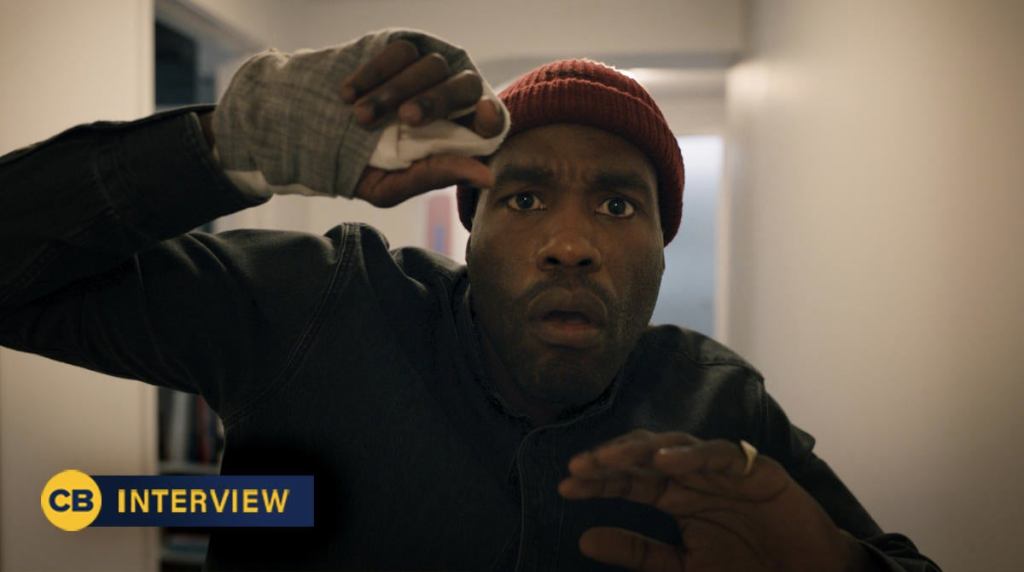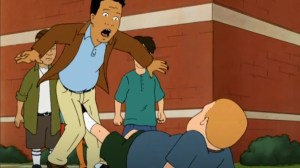Based on the Clive Barker short story “The Forbidden,” 1992’s Candyman managed to not only be a disturbing exploration of an urban legend, but also wove in themes of racism and societal fears, while also injecting a fair share of gothic romance, establishing itself as a standout horror film of the ’90s. While it earned two sequels, they both fell far short of expectations, resulting in the character of Daniel Robitaille fading out of the spotlight of modern horror. Luckily, producer and writer Win Rosenfeld teamed up with writer Jordan Peele and director Nia DaCosta to revive the figure for a fresh and familiar take on the urban legend, resulting in this year’s chilling Candyman, which is out now on 4K Ultra HD Blu-ray, Blu-ray, DVD, and Digital HD.
Videos by ComicBook.com
For decades, the housing projects of Chicago’s Cabrini-Green were terrorized by a ghost story about a supernatural, hook-handed killer. In present day, a visual artist (Yahya Abdul-Mateen II; HBO’s Watchmen, Us, forthcoming Matrix Resurrections) begins to explore the macabre history of Candyman, not knowing it would unravel his sanity and unleash a terrifying wave of violence that puts him on a collision course with destiny.
ComicBook.com caught up with Rosenfeld to talk the development of the project, the film’s exciting conclusion, and what the future could hold for the series.

ComicBook.com: As a fan of horror growing up, what sort of impact did Candyman have on you and how did that impact your approach to this film?
Win Rosenfeld: Candyman is one of the first movies that I remember really scaring the crap out of me. The original was one of those benchmark moments, where it felt like it was a horror movie that defied a lot of traditional structures of how a horror movie unfolds. It was very confident in its quiet moments and its building of dread.
And finally — and not finally, by the way, because I could talk about this forever — but just to say the other thing that I loved about it was that as a villain, Candyman, the demon, was very unique to me. And Tony Todd’s depiction of Candyman, in particular, was something that was elegant, was regal, was imperious, and powerful. And that was just such a sharp contrast to the other supernatural killers at the time, who were a little grimier, a little more of the Michael Myers and the Jasons and the Freddys, who, I also love all of them, but there was something that really stuck out. Almost like a king demon, which he always felt like to me.
Also, by the way, the other thing I would say is that it was very, very cool to have a horror movie that was set in a city. I’m a New Yorker, not a Chicagoan originally, but it was just cool to see something happen in apartments and not in the suburbs.
I know that in the original script, Helen Lyle was going to be the villain, and things changed when Nia got involved and started collaborating on the script. Were there other major differences in that original version of the story before it evolved into what we saw?
It’s tough. It’s a tricky question because the script evolved a lot, so I wish I could say we had an initial version and then that got revised and then there was another version. I think that what we needed was an incredible amount of command over subtlety and character. I actually feel like Helen looms pretty large in this movie. She exists, I think, as a thematic ballast in a lot of ways and certainly haunts the whole premise in some ways. As us horror fans know, sometimes the scariest way to have a villain like that, or however you want to look at Helen, is by not showing them at all.
And speaking to that collaboration, it sounds like it was a conversation and evolution instead of you just handing things off to Nia to run with?
Absolutely. One of the great joys of my life, and I think one of the reasons why Jordan and I get out of bed in the morning, is the ability to work with geniuses all the time. Nia is so incredibly collaborative and engaged and constructive, and once we hired a director for a movie, it’s their movie and our job becomes really working for them, but I would say in terms of an organic open chain of conversation, we were building this thing together the whole time and it was really, really fun and we loved working with her. That’s a long answer to a simple question, which is no, we didn’t just email her the last draft and say, “Peace out.” We were really there to support her along the way and help bring her vision to life.
WARNING: Spoilers below for Candyman
In the film’s finale, we see Colman Domingo’s character make an unexpected change and we see how he wants to create a new Candyman for the neighborhood, and watching the film a second time, I had a better appreciation for the hints that his character was headed that way the whole movie. Were there other, longer versions of that ending that might have been more blatant about his agenda?
I think the idea was always that we wanted to look at Colman’s character and [Vanessa Williams’] character as two poles that were in dialogue with one another. And, in some ways, this is a film that’s very much about trauma and the processing of trauma and particularly the disproportionate impact that violence and socioeconomic disparity has on Black people and people in the inner city. I think what you see with those two characters is that William Burke, which is Colman’s character, is very much dedicated to keeping that memory alive. He comes from the school of, we can’t forget our past, we can’t run away from our traumas that have defined us.
So the logical extension of that is that he almost is in a place where he’s trying to create a seance to bring back the avatar of what that pain was because denial of it equals erasure, which is one of the great, I think, many sins of white supremacy in America is this feeling of erasure and trying to pretend like it doesn’t matter, that didn’t matter. And there’s value to that, right? I mean, there’s value to remembering history.
Now, on the other hand, you have Vanessa’s character, who has basically decided “I need to run from this. I’m going to tell my son that we don’t even come from there.” We’re going to try to say, “We need a new, fresh beginning. We should never, shh, we don’t speak his name even,” and to move away from each other. So it was always important to us as a foundation of the movie that those two pull … Particularly because it’s a story about stories, right? A story about retelling and keeping a memory alive, and the iterations of a story that those two are always in dialogue with one another, even though they don’t share any actual time on screen, and Anthony is caught between those two ideologies. So, I think that dynamic was always there. That was pretty foundational to the story. Are there versions where there was a little more connecting the dots or a little less? Probably, yeah, somewhere along the line, but we always wanted that to get through.
Looking to the future, did you see this as bringing Candyman back to his rightful throne to then have continued adventures or did you see this as more of a full circle narrative, closing the loop on the Candyman franchise? Do you see yourself having a future with this franchise or was this just like a loving sendoff?
I think it always comes down to, is there something new to say? Is there something new? You could make … We don’t ever presume to have closed the book on something as epic as Candyman. I don’t know. I mean, there’s a part of you that comes into a movie, at least for Jordan and Monkey Paw, the way we look at things, we don’t try to create something as a launchpad for a franchise. So that’s not how we think and so our idea was we did want to be in conversation with and be an almost mirror image to the original.
Mirrors, obviously, another big theme here and to the original film in a lot of ways. And so those two things could play off of each other. I guess, in a sense, you could argue that creates a whole circle in the beginning of a new cycle, but I don’t know. I’m certainly … I think we’ve, and the internet is very, very eager to remind me, that we have left a lot of mythology there that could be explored in a lot of different ways. And certainly, if that’s Yahya or Tony [Todd], or I don’t know. I think it could go any way.
I know you’re working on a new People Under the Stairs, and with Candyman, people didn’t know if it was a remake or a reboot or a sequel, so when it comes to that other film, is there anything you can hint at or tease as far as what audiences can expect with it?
I think, unfortunately, I’m going to have to leave you guessing. I do love your site and I’m dying to give you guys whatever scoops I can. I can’t give you that one, but just to say, we’re approaching it with the same reverence and love that we approached the original Candyman with and how that will express itself, I think, may be different.
Candyman is out now on 4K Ultra HD Blu-ray, Blu-ray, DVD, and Digital HD.
This interview has been edited for length and clarity. You can contact Patrick Cavanaugh directly on Twitter.








